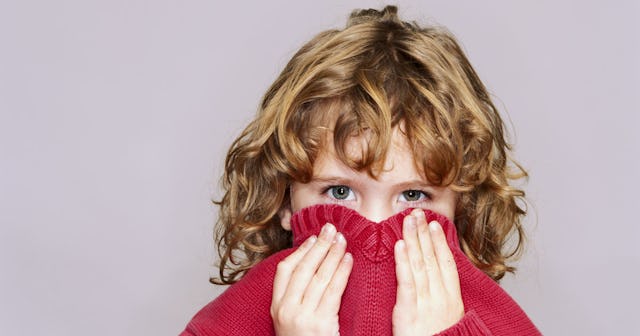How I'm Learning To Support My Introverted Child

The old adage “She marches to the beat of her own drum” holds true for my five-year-old daughter. When she is out and about, she can be found happily picking up flowers or humming a tune. She is a little girl who is energized after spending time alone. She is a little girl who can be found playing alone on the playground or digging in the dirt creating “art.” Above all, she prefers to stay at home to draw, paint, or color — a self-professed “I just want to spend time at home” kind of kid. I am an introvert with extroverted tendencies, so the apple doesn’t fall too far from the tree. My daughter is a twin, and her sister is very much an extrovert.
I want to encourage her to be who she is. More than 75% of people are categorized as extroverts, while 25% of us are introverts, so it’s up to us to help others understand — especially for the sake of our children.
As my introverted twin is getting ready to move up from kindergarten to first grade, neither she nor I feel any pressure for her to make this transition with a boatload of friends. She is happy with just a few friends, the girls she plays with at recess or sits next to at lunch. She does not come home asking for a playdate.
The Center for Parenting Education notes, “Parents and educators can play an important role in helping children embrace their inner selves. Since introverts tend to need time to process their experiences and do not readily talk about what they are thinking, the adults in their lives may need to reach beyond the surface to discover their many hidden gifts.” It’s important to keep a plethora of tools in your toolbox to connect with your kid. One thing I’ve found useful is to talk less and listen more, especially when my introverted daughter is ready to speak.
When we are sitting around the dinner table, we often play games. These games not only give us the opportunity to bond, but provide an opportunity for my kid to verbally express herself in the presence of others. We play a game called “This or That,” where one of us asks a question like, “Would you choose an ocean or a river?” and the everyone else answers. Others can then ask follow-up questions; this gives us all an opportunity to share about ourselves.
As parents, we can share about our own personalities and how they relate to our needs. As a writer, I spend a lot of time on my laptop and in deep contemplation. I share with my kids (actually, my entire family and anyone else who will listen) that I need quiet time. I need to work quietly, and I prefer quiet to noise. And here is where I am able to connect with my introverted daughter. This is also an opportunity for other family members to listen to our needs as well.
We live in such a busy world, and the pandemic taught us that we can all slow down a bit. That’s a good thing for introverts, who tend to do just that: they go at their own pace, often slower than others, and prefer smaller groups compared to larger ones. In an article from Verywell Family, author Carol Bainbridge shares, “The mistake that most people make is in thinking that introversion is the same thing as loneliness or shyness or that an introvert is inherently asocial. In fact, one of the characteristics of introversion is the ability to be more sensitive to social cues and meanings. Introverts are typically more empathic and interpersonally connected than their more socially dynamic counterparts.”
Both my daughter and I are extremely self aware and in touch with the feelings of others. I, like my daughter, feel connected to people in ways that go beyond small talk. Introverts want to build lasting relationships and, at times, can be more sensitive — especially if their feelings are hurt. I speak from experience on this one. As the parent of a very emotionally sensitive child, I have to dig deep for patience when she is melting down. Once she’s quiet and ready to listen, she is receptive to my advice: “Not everyone is going to want to play that game in the same way you do” or “Clare should have other friends, not just you.” These things can be hard to hear, but our children need to know these things to survive in the social world.
We can learn from our introverted child just as much as we can teach them. We are all still learning, about how to manage crowds, how to open up to others and share. As parents, we can learn what makes our kids happy by asking them questions — and listening to their answers. We can create a quiet space for them, slow down with them, sit with them in a more private space where they can feel comfortable.
We know that our kids are watching us and they deserve to know that we are in their corner — whether they run and give us a hug after school, or come into the house wanting space and quiet after a long day. They need to know we will accept them and love them for being exactly who they are.
This article was originally published on